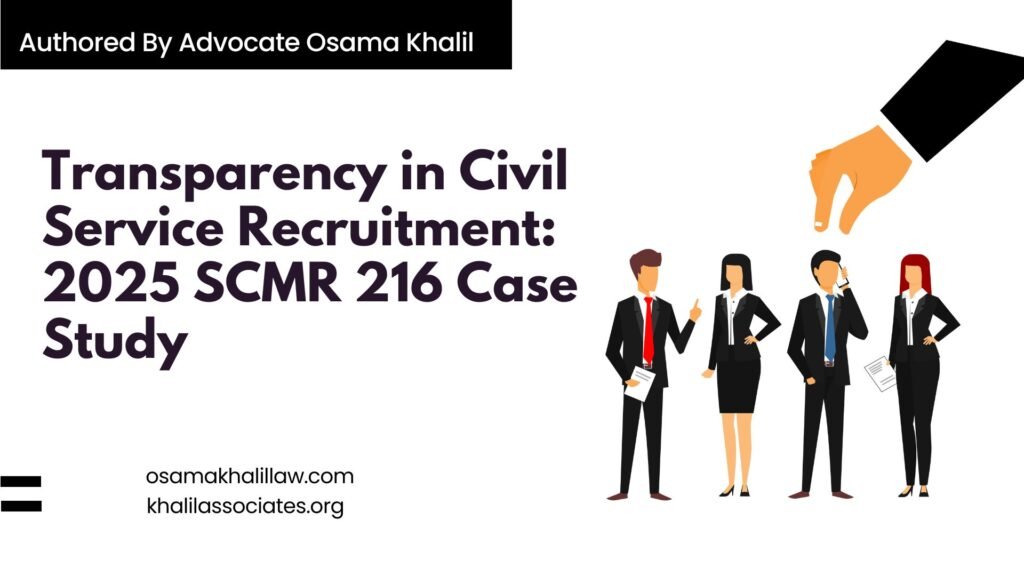
The Supreme Court of Pakistan’s judgment in Ayaz and others versus Mustafa Saeed and others (2025 SCMR 216) highlights the importance of transparency, merit, and fairness in civil service recruitment. This case shows the consequences of ignoring recruitment rules and the need for accountability in public service appointments.
The Case Background
The dispute centered on the recruitment process for the position of Assistant Conservator of Forests (BPS-17) in Sindh. The Sindh Public Service Commission (SPSC) initially advertised two posts for urban candidates in July 2020. However, an addendum issued in September 2020 changed the recruitment process significantly. The original two urban posts became one urban and one rural post, and the number of vacancies increased from two to seven without re-advertising. Additionally, the upper age limit for applicants was relaxed by up to 15 years.
The petitioners, unsuccessful candidates, challenged these changes. They argued that the modifications violated recruitment regulations and favored individuals with connections to high-ranking officials. The High Court of Sindh declared the recruitment process null and void, directing the SPSC to re-advertise the posts and ensure a fair and transparent competitive process.
The Supreme Court’s Ruling – Recruitment Process Integrity
The Supreme Court upheld the High Court’s decision, stressing the importance of following recruitment regulations and maintaining transparency in public service appointments. The Court noted that the SPSC failed to follow its own rules, especially those requiring re-advertisement for additional vacancies and changes in eligibility criteria.
The Court also criticized the excessive age relaxation, which allowed candidates up to 45 years to apply for positions with a retirement age of 60. This meant selected candidates would serve only 15 years before retiring, placing a significant financial burden on the government due to pension liabilities. The Court struck down the notification granting this age relaxation, calling it unreasonable and disproportionate.
The Importance of Merit and Transparency – Equal Opportunity in Hiring
The judgment highlights the principle that merit should be the sole criterion in civil service recruitment. The Court reiterated that favoritism, nepotism, and lack of transparency undermine public trust and lead to inefficiency and discontent within the civil service.
Transparency in recruitment ensures all candidates have an equal opportunity to compete based on their qualifications and abilities. It also builds public confidence in the integrity of the process, ensuring only the most deserving individuals are selected to serve the nation.
Lessons for Recruitment Reforms
This case serves as a wake-up call for recruitment authorities to strictly follow regulations and prioritize merit over personal connections. The SPSC and other public service commissions must ensure all recruitment processes are conducted openly, with clear communication of eligibility criteria, deadlines, and selection procedures.
Moreover, the judgment highlights the need for rational and proportionate policies, especially regarding age relaxation and other eligibility criteria. Excessive benefits, like the 15-year age relaxation in this case, can lead to unintended consequences, including financial strain on the government and unfair advantages for certain candidates.
Moving Forward
The Supreme Court’s decision in Ayaz and others versus Mustafa Saeed and others sets a strong precedent for upholding transparency and merit in civil service recruitment. It reminds us that public service appointments are a sacred trust, and those responsible for recruitment must act with integrity, fairness, and accountability.
By re-advertising the posts and ensuring a fair competitive process, the SPSC has an opportunity to restore public confidence in its operations. This case also highlights the need for continuous reforms in recruitment regulations to prevent similar issues in the future and ensure the civil service remains a pillar of good governance.
In conclusion, the 2025 SCMR 216 judgment is a significant step toward promoting transparency and meritocracy in civil service recruitment. It reinforces the principle that public service appointments must be free from favoritism and conducted with the utmost integrity to serve the best interests of the nation.

I’m really inspired with your writing abilities and also with the structure for your weblog. Is that this a paid subject or did you customize it yourself? Either way stay up the nice high quality writing, it is rare to look a great weblog like this one nowadays!